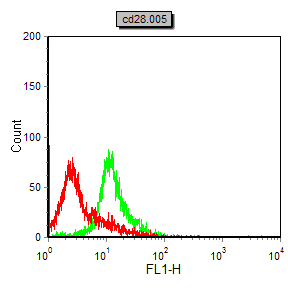
| WB | 1/500-1/2000 | Human,Mouse,Rat |
| IF | 咨询技术 | Human,Mouse,Rat |
| IHC | 咨询技术 | Human,Mouse,Rat |
| ICC | 技术咨询 | Human,Mouse,Rat |
| FCM | 1/200 - 1/400 | Human,Mouse,Rat |
| Elisa | 咨询技术 | Human,Mouse,Rat |
| Aliases | Tp44 |
| Entrez GeneID | 940 |
| clone | 3E7H3 |
| WB Predicted band size | 25kDa |
| Host/Isotype | Mouse IgG1 |
| Antibody Type | Primary antibody |
| Storage | Store at 4°C short term. Aliquot and store at -20°C long term. Avoid freeze/thaw cycles. |
| Species Reactivity | Human |
| Immunogen | Synthetic peptide of human PLBD1 |
| Formulation | Purified antibody in PBS with 0.05% sodium azide |
+ +
以下是关于CD28抗体的3篇代表性文献,涵盖基础机制、治疗应用及临床案例:
---
1. **文献名称**: *Cytokine Storm in a Phase 1 Trial of the Anti-CD28 Monoclonal Antibody TGN1412*
**作者**: Suntharalingam, G. et al.
**摘要**: 该文献报告了抗CD28超激动剂抗体TGN1412的I期临床试验结果。6名健康受试者在给药后出现严重的细胞因子风暴,导致多器官衰竭。研究揭示了CD28超激动剂抗体在强效激活T细胞(尤其是调节性T细胞)的同时可能引发不可控的免疫反应,强调了此类抗体在临床设计中的风险。
---
2. **文献名称**: *CD28 and CTLA-4 have opposing effects on the response of T cells to stimulation*
**作者**: Lenschow, D.J. et al.
**摘要**: 通过体外使用抗CD28抗体阻断或增强共刺激信号,研究发现CD28通路显著增强T细胞活化和增殖,而CTLA-4则起抑制作用。该研究奠定了CD28作为关键共刺激受体的理论基础,并为后续抗体疗法开发提供了依据。
---
3. **文献名称**: *Superagonistic Anti-CD28 Antibodies: Unique Activators of Regulatory T Cells*
**作者**: Hünig, T. et al.
**摘要**: 研究发现某些抗CD28单克隆抗体(如超激动剂抗体)能够选择性激活调节性T细胞(Tregs),而非效应T细胞。这种特性被探索用于自身免疫性疾病的治疗,例如在多发性硬化模型中通过增强Treg功能抑制炎症反应。
---
**备注**:CD28抗体的研究涵盖激动剂(如TGN1412)和拮抗剂(如用于抑制移植排斥)两种方向。后续研究更注重抗体设计的安全性,例如开发仅结合特定表位或联合其他靶点的双特异性抗体。
CD28 is a critical co-stimulatory receptor expressed on T cells, playing a pivotal role in adaptive immune responses. Upon binding to CD80/CD86 ligands on antigen-presenting cells (APCs), CD28 synergizes with T cell receptor (TCR) signaling to amplify T cell activation, survival, and cytokine production. This "second signal" mechanism ensures proper immune activation while preventing anergy.
CD28-targeting antibodies have been explored therapeutically to modulate immune responses. Agonistic anti-CD28 antibodies were initially investigated to enhance T cell activation in cancer immunotherapy or immunodeficiency. However, a notorious clinical trial in 2006 (TGN1412. a super-agonistic anti-CD28 antibody) caused severe cytokine storms in healthy volunteers due to uncontrolled systemic T cell activation, highlighting the risks of excessive immune stimulation.
Conversely, antagonistic anti-CD28 antibodies or fusion proteins blocking CD28-CD80/86 interactions have shown promise in autoimmune diseases and transplantation by inhibiting pathogenic T cell responses. For example, abatacept (CTLA4-Ig), which blocks CD28 co-stimulation, is approved for rheumatoid arthritis. Recent research also explores CD28 modulation in CAR-T cell therapies to improve persistence and reduce exhaustion. Additionally, selective CD28 antagonists are being developed to minimize immunosuppressive side effects compared to broad-spectrum therapies.
The dual role of CD28 in immune activation and regulation continues to drive therapeutic innovation, emphasizing the need for precise targeting strategies to balance efficacy and safety.
×